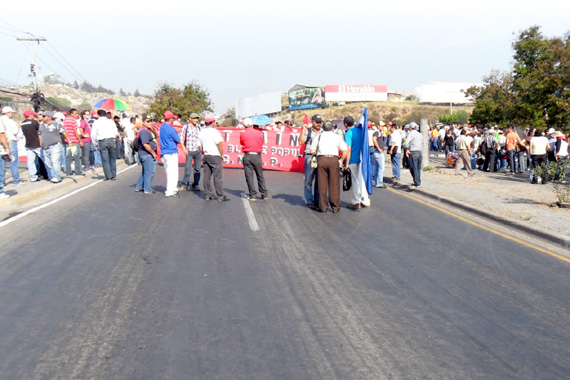On the morning of March 30, the oppressive regime of Porfirio
Lobo stepped up its savage attacks on the population with the aim of preventing
the mass mobilizations that were spreading throughout the country under the
National Civic Strike called by the FNRP (National Popular Resistance Front).
The repressive actions have involved a violent raid against the headquarters of
STIBYS, police forces opening fire on demonstrators in Bajo Aguán, and dozens of
protesters wounded across the country.
On the morning
of March 30, Hondurans woke to a virtually paralyzed nation, with roads
blocked throughout the country. Reports of various mobilizations that were
stopping national and international traffic started coming in since the break of
dawn.
In the capital,
Tegucigalpa, protesters marched in several districts of the city, taking over
major avenues and bridges.
Meanwhile,
hundreds of teachers, who are fighting against the privatization of education
and standing up to the brutal repression unleashed over the last two weeks,
gathered in front of the Supreme Court of Justice to demand the release of 20
teachers arrested on charges of staging illegal demonstrations and insurrection.
In reaction to
this new display of strength and mobilizing capacity by the Honduran people, the
regime that succeeded the coup revealed once again its true face, repressing the
resistance for the second week in a row.
“There are
repressive actions throughout the country, but people are still resisting in
Progreso, San Pedro Sula, Santa Rosa de Copán, Olancho, Colón, and here in the
capital, and in many other places. Roads are being blocked again and the
struggle continues,” Bertha Cáceres, coordinator of the Civic Council of
Popular and Indigenous Organizations of Honduras (COPINH), told
Sirel.
“The situation
is worse than it was during the first days following the coup, but we’ve learned
a lot and are now better prepared to respond to repression.”
“We are
defending our rights, our territory, and our gains. We’re confident that nothing
can stop this ongoing mobilization,” Cáceres said.
The member of
the steering committee of COPINH also spoke against the hypocritical
policy of the United States, which continues to provide funding for the
state’s repressive bodies and deploys its troops in Honduran soil.
STIBYS under fire
During the
brutal repression ordered by the Honduran regime, the headquarters of the
combative Union of Beverage and Related Industry Workers of Honduras (STIBYS)
was violently raided, leaving several people injured and others arrested by the
police.
“Starting at
6:30 a.m, the roads across from STIBYS’ headquarters were blocked by
labor and popular organizations. At 10:30, hundreds of police and military
officers came at us with tear gas and water cannon trucks loaded with stinging
liquid. They started savagely beating the people gathered there, and chasing
them down the neighborhoods surrounding our headquarters,” Porfirio Ponce,
vice president of STIBYS, told
Sirel.
“Many people
ran for cover in STIBYS’ headquarters. But that didn’t stop their
criminal violence.”
“They began
throwing tear gas bombs into our offices from the street. It got so we couldn’t
breathe anymore, many people had to be taken to the hospital, and some were
arrested.
These
repressive actions are not going to intimidate us; we won’t be stopped. We’re
going to continue with this struggle, the struggle of the Honduran people for
the rights of workers, in defense of social gains, education and public health,
and against neoliberal policies.
This regime was
spawned by a flawed process and represents the continuation of the coup,”
Ponce continued. “There are no valid government institutions in Honduras,
and the de facto powers that control the country won’t be stopped.”
“But our people
will not be silenced. We have been constantly repressed for two weeks now, and
we’re still resisting in the streets. Tomorrow we plan to mobilize again and
we’re calling on international solidarity to denounce what is happening,” the
STIBYS leader concluded.
As this report
was being written, Wilfredo Paz, a teachers’ union leader and
FNRP member, informed SIREL that the police had opened fired against
protestors in Bajo Aguán, leaving several wounded.
“The police
dispersed us violently, chasing us with gunfire. Some of us regrouped and tried
to block the road in the Sonaguera area again.”
“There are
dozens of people wounded across the country, the police open fire on teachers,
peasants, and members of the Resistance.”
“The police
also attacked the Universidad Autónoma de Honduras, acting with the same
brutality. The students are resisting, but the police are closing in,” Paz
concluded.
